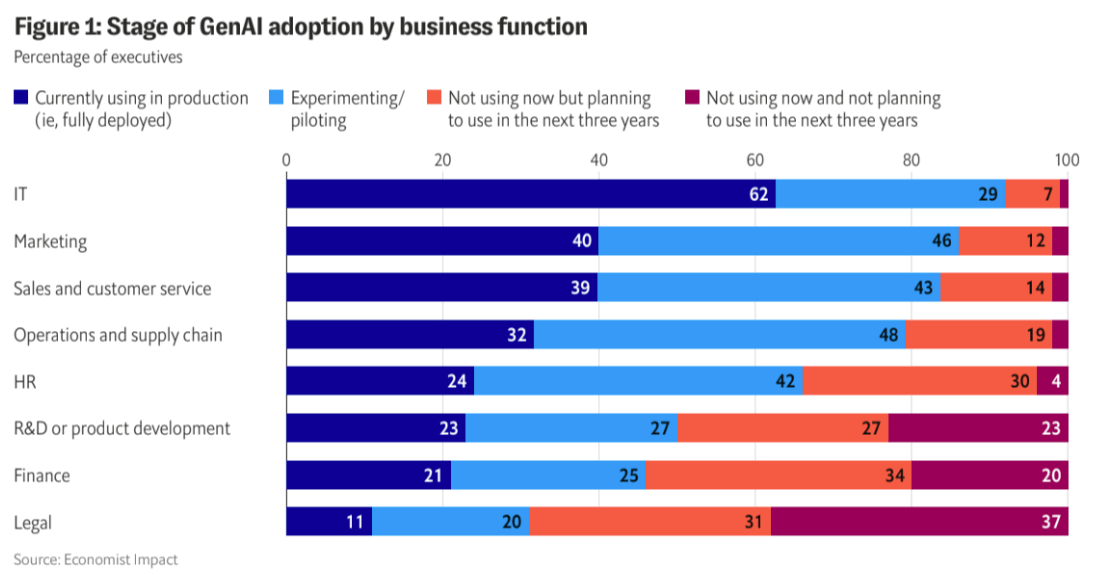When the Generative AI boom first ignited, every enterprise rushed to deploy the technology. For many, that excitement remains. But companies are also now keenly aware of the challenges in bringing AI to life. And they’re revising their strategies, shifting focus from general-knowledge LLMs, to specialized systems that can drive true business benefit.
We collaborated with The Economist to understand how AI is playing out in the real-world. Unlocking Enterprise AI: Opportunities and Strategies, a new report that dives into the current state of enterprise AI based on a survey of 1,100 executives and technologists, as well as 28 C-Suite executives.
The findings tell us a lot about how enterprises are strategizing with AI within their organizations. One thing is clear: the “winners” in every industry will be those that take a holistic approach to AI, one that encompasses data management, security, governance, culture, and domain-specific expertise – and ultimately, they’ll make AI available to a wide set of employees.
Here’s a snapshot of key findings from the Economist Impact survey.
Leaders will use AI to unlock value, revenue and business model innovation in the long term. The vast majority of enterprises (85%) are using or testing Generative AI (GenAI) in at least one function. By 2027, 99% of executives believe their organizations will be testing/using GenAI for both internal and external use cases. The report shows wide productivity gain from those GenAI early adopters, but executives emphasize strategic competitive advantages as the real prize. As Senthil Ramani, global lead, data and AI, Accenture states, “Most of the value that you see on AI is buried in the bottom. The top is immediate benefits like productivity, but that’s the starting point. You’ve not gone into your core value chain, that’s when you go beneath the iceberg. That is where your proprietary data is.”

Enterprise-wide AI requires an infrastructure refit—most companies do not feel confident in their current architecture: Only 22% of organizations say their current architecture can effectively support new AI workloads. 40% of respondents acknowledge their organization’s data and AI governance is insufficient. As a result, only 37% of executives believe their GenAI applications are production-ready. All executives interviewed for the report agree on the importance of fixing the plumbing. Carol Clements, Chief Digital and Technology Officer of JetBlue summarizes it well, “You can have all the AI in the world, but if it’s on a shaky data foundation, then it’s not going to bring you any value.”
Momentum for open AI systems continues: As open source AI technology continues to match the performance of proprietary solutions, more companies are taking advantage. Based on the survey results, 78% of businesses have experimented or fully deployed open source GenAI. By 2027, 96% plan to deploy open source AI models. While off-the-shelf models have clear limitations, two-thirds of organizations see significant potential in integrating GenAI models with their own data. As Juan Jose Casado, Chief Digital Officer, Repsol says, “In the future, the market will move to the use of small private LLMs. But GenAI is a new technology. We still need to learn how to launch and put initiatives into production in an agile way.”
Calibrating humans and machines is still a balancing act: Only one in six firms are confident in their ability to attract the talent needed to take full advantage of AI technologies. Those who succeed are deploying AI at a much faster rate. For many, the future is one where even non-technologists can use the technology to enhance productivity and efficiency. 97 percent of architects expect that, by 2027 all employees will interact with complex data sets through natural language commands, 58% say that natural language will be the primary—or only—way they do this. Leonel Garciga, Chief Information Officer, US Army summarizes this well, “We’re moving away from data literacy being a specialized skill. All employees must understand data protection, platform use and centralized data storage. The US Army has incorporated these into its leadership training and has recognized that managing sensitive data is crucial to the Army’s AI use cases.”
This is just the surface of what The Economist Impact research discovered about enterprise approaches to GenAI – and their future plans. Read the report here and survey summary to help you plan your own AI strategy.



